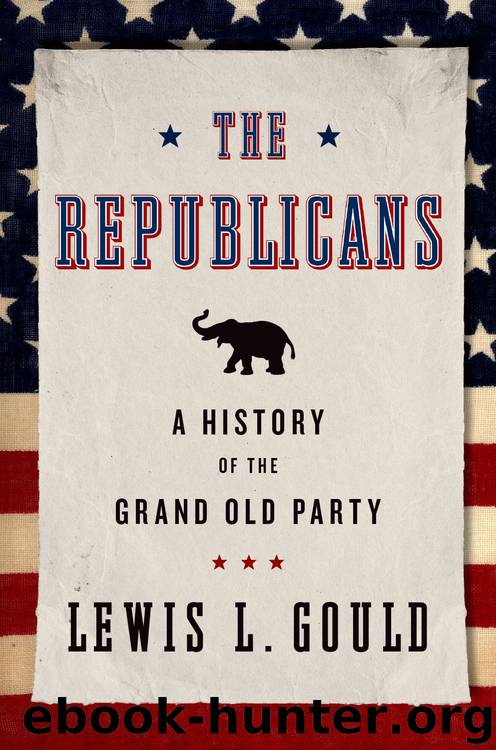The Republicans by Gould Lewis L.;

Author:Gould, Lewis L.;
Language: eng
Format: epub
Publisher: Oxford University Press, Incorporated
Published: 2014-07-27T16:00:00+00:00
9
From “Had Enough” to Modern Republicanism, 1945–1961
the republicans were once again meeting in Chicago in July 1952 amid intense passions as Robert A. Taft and Dwight D. Eisenhower struggled for the nomination. After twenty years out of power, victory against the Democrats in the fall seemed probable. First the party had to decide between “Mr. Republican” and the American military hero of World War II. The contest was close, hinging on a cluster of disputed delegates from the South. The Eisenhower forces charged that Taft’s allies were trying to steal delegates, and they sought “fair play.” The Taft camp believed that their candidate was being cheated out of a nomination that belonged to him. Once again, they felt, eastern Republicans were thwarting the will of the party. A decade and a half of strife between the factions swelled to a climax.
The symbol of frustration for the Taft delegates was the New York governor, Thomas E. Dewey, the losing presidential candidate in 1944 and 1948. Now Dewey was the brains behind the effort to put Eisenhower in the White House and the spirit behind the claim that Taft “can’t win.” At a key moment in the struggle over the delegates, the Taft leaders decided to make Dewey the issue. They selected Senator Everett M. Dirksen to speak on Taft’s behalf during the debate over the issue of the contested delegates. The Senator’s real task was to take on Dewey and his controversial role in the party. With his wavy hair and stentorian voice, the grandiloquent Dirksen assailed the New Yorker. Spotting Dewey in the audience, he said, “We followed you before and you took us down the road to defeat.” 1
Dirksen’s words set off a spontaneous outpouring of Dewey denunciation. Boos rang out through the hall, some of them intended for Dirksen, but most directed at Dewey. From the galleries, jeers rained down on the imperturbable New Yorker. A national television audience (or as national as it was in those days) watched as the pent-up animosities of the New Deal and Fair Deal were unleashed on the convention floor. The next day the Taft leaders styled Dewey as “the greatest menace that the Republican party has.” 2
In the end, Dewey’s cause triumphed and Eisenhower was nominated, but the long-term victory would rest with the conservatism that Taft and Dirksen represented. During the 1940s and 1950s, the Republicans sought and then won national power. Nonetheless, their own sense of themselves as a party remained in flux during the years between the end of World War II and the presidential candidacy of Richard Nixon in 1960.
That television viewers saw for themselves Dirksen’s attack on Dewey was one major indicator of how politics had changed for both parties after the end of World War II. In 1948, under 1 percent of American homes had a television set. By 1952 the number had risen to more than 34 percent. Televised hearings of Senator Estes Kefauver’s investigation of organized crime attracted big audiences in 1951. A
Download
This site does not store any files on its server. We only index and link to content provided by other sites. Please contact the content providers to delete copyright contents if any and email us, we'll remove relevant links or contents immediately.
The Secret History by Donna Tartt(18422)
The Social Justice Warrior Handbook by Lisa De Pasquale(12010)
Thirteen Reasons Why by Jay Asher(8571)
This Is How You Lose Her by Junot Diaz(6557)
Weapons of Math Destruction by Cathy O'Neil(5953)
Zero to One by Peter Thiel(5557)
Beartown by Fredrik Backman(5432)
The Myth of the Strong Leader by Archie Brown(5298)
The Fire Next Time by James Baldwin(5099)
How Democracies Die by Steven Levitsky & Daniel Ziblatt(5022)
Promise Me, Dad by Joe Biden(4967)
Stone's Rules by Roger Stone(4929)
100 Deadly Skills by Clint Emerson(4745)
A Higher Loyalty: Truth, Lies, and Leadership by James Comey(4656)
Rise and Kill First by Ronen Bergman(4593)
Secrecy World by Jake Bernstein(4485)
The David Icke Guide to the Global Conspiracy (and how to end it) by David Icke(4473)
The Farm by Tom Rob Smith(4366)
The Doomsday Machine by Daniel Ellsberg(4303)
